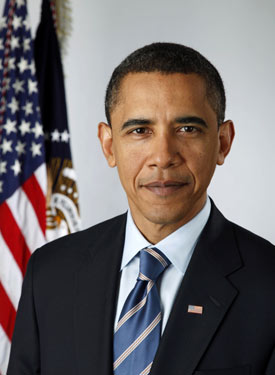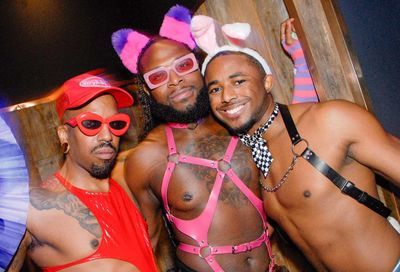Maxine Waters, Tavis Smiley say Obama would not tell gays and others to “stop complaining” [video]
President Barack Obama‘s recent speech before the Congressional Black Caucus seems to have riled up some Americans for the wrong reasons. Some leading figures are objecting to his choice of words about “complaining, grumbling and crying.” They say he would not talk to gays and other groups the way he did with the Black Caucus.
 At the close of the half-hour speech, Obama took on a fiery tone intended to rouse the live audience. He quoted Martin Luther King, Jr. and challenged CBC members to take action and keep fighting for their needs in the face of continuing adversity. He said (WhiteHouse.gov):
At the close of the half-hour speech, Obama took on a fiery tone intended to rouse the live audience. He quoted Martin Luther King, Jr. and challenged CBC members to take action and keep fighting for their needs in the face of continuing adversity. He said (WhiteHouse.gov):
”We must still face prodigious hilltops of opposition, and gigantic mountains of resistance, but with patient and firm determination, we will press on. But the future rewards, those who press on. With patient and firm determination, I’m going to press on for jobs. I’m going to press on for equality. I’m going to press on for the sake of our children. I’m going to press on for the sake of all those families who are struggling right now. I don’t have time to feel sorry for myself. I don’t have time to complain. I’m going to press on.
”I expect all of you to march with me and press on. Take off your bedroom slippers. Put on your marching shoes. Shake it off. Stop complaining. Stop grumbling. Stop crying. We are going to press on. We’ve got work to do. CBC, God bless you; and God bless the United States of America.”
The controversy that erupted over his parting paragraph all but drowned out the rest of his 27-minute message. His final words were taken out of context and reposted as eye-popping headlines that read:
- “Obama to Blacks: ‘Stop Complaining'” (Daily Beast)
- “Obama Tells Blacks to ‘Stop Complainin’ and Fight” (Associated Press/ABC)
- “Obama pushes back against the Congressional Black Caucus” (Yahoo News/The Ticket)
A common news narrative about Obama’s relationship with African-Americans indicates that some people have become disillusioned, claiming the President has not adequately addressed the black community’s needs. As a result, the theory goes, African American voters will be less likely to vote next November. Some also believe that the President has avoided addressing racial issues because, if he would, Obama’s far-right adversaries would fault him for being racially divisive and claim he gives special attention and benefits to black Americans.
Obama’s racial background has, of course, been the topic of numerous controversies. His origin of birth, teenage years, and choice of church, for example, have all been targets of derision — mostly by conservatives and Republicans. Some African-Americans, like Jesse Jackson, took issue with Obama back in 2008 when he used a Father’s Day speech to address absent fathers in the black community (AFP).
This summer, Rep. Maxine Waters (D-CA) addressed the tensions during a tour that she and the Caucus had taken of U.S. cities. One video showed Waters telling a somewhat raucous crowd in Detroit that she was waiting for the community to “unleash us [politicians] and… tell us you’re ready for us to have this conversation [with Obama].” She said (MSNBC via YouTube):
“The Congressional Black Caucus loves the President, too. We’re supportive of the President but we’re getting tired, y’all. We’re getting tired. What we want to do is give the President every opportunity to show what he can do, and what he’s prepared to lead on…. But our people are hurting. The unemployment is unconscionable. We don’t know what his strategy is…. We are trying to do the right thing and the best thing. When you let us know it’s time to let go, we’ll let go.”
CBS news asked Maxine Waters on Monday what she thought of President Obama’s speech. She replied that the CBC had been actively addressing high unemployment among black Americans through forums and job fairs. Waters (who is a strong supporter of the LGBT community) then added (CBS Early Show):
“I’m not sure who the President was addressing. I found that language a bit curious, because the President spoke to the Hispanic Caucus. And certainly they’re pushing him on immigration…. He certainly didn’t tell them to stop complaining. And he would never say that to the gay and lesbian community who really pushed him on Don’t Ask, Don’t Tell. Or even in a speech to AIPAC, he would never say to the Jewish community, ‘Stop complaining about Israel.’ Because we’re certainly not complaining, we’re working to support him, and we’re protecting that base because we want people to be enthusiastic about him.”
PBS talk show host Tavis Smiley echoed the same point while speaking with Rep. Sheila Jackson Lee (PBS):
“Would the President ever say to our Jewish brothers and sisters — concerned about the plight, the crisis in the Middle East — ‘Stop complaining, stop grumbling, stop crying?’ Would this President ever say to Wall Street publicly, ‘Stop grumbling, stop complaining, stop crying?’ Would he ever say to our Hispanic brothers and sisters on immigration and their concerns, ‘Stop grumbling, stop crying, stop complaining?’ Did he say to gays and lesbians, ‘Stop grumbling, stop complaining, stop crying?’ How does he get away with saying this to black folk when he would never form his lips to ever say that to any other constituency?”
Rachel Maddow of MSNBC observed the speech differently on her program. She pointed out that it was intended to be a rallying cry — one speech in a series where Obama requested help from his supporters. Maddow also pointed out that the audience enthusiastically cheered at the end of the President’s ”let’s get up and go style speech” (MSNBC).
President Obama is scheduled to address LGBT Americans this weekend, delivering the keynote speech at the upcoming Human Rights Campaign National Dinner. The sold-out event will be held Saturday, Oct. 1, in Washington, D.C.
President Barack Obama’s entire speech to the Congressional Black Caucus, Sept. 25, 2011:
Maxine Waters at Detroit CBC forum:
Rachel Maddow’s take with Rep. Barbara Lee:
Support Metro Weekly’s Journalism
These are challenging times for news organizations. And yet it’s crucial we stay active and provide vital resources and information to both our local readers and the world. So won’t you please take a moment and consider supporting Metro Weekly with a membership? For as little as $5 a month, you can help ensure Metro Weekly magazine and MetroWeekly.com remain free, viable resources as we provide the best, most diverse, culturally-resonant LGBTQ coverage in both the D.C. region and around the world. Memberships come with exclusive perks and discounts, your own personal digital delivery of each week’s magazine (and an archive), access to our Member's Lounge when it launches this fall, and exclusive members-only items like Metro Weekly Membership Mugs and Tote Bags! Check out all our membership levels here and please join us today!






















